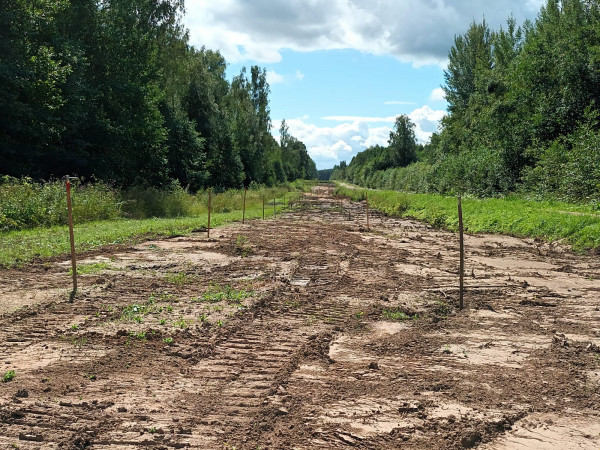








On the external land border between the Republic of Latvia and the Republic of Belarus, active land preparation works are ongoing in the length of 16 km to perform the land levelling within the 12 m wide strip for the construction of the border infrastructure and a permanent fence, informs Renārs Griškevičs, Chairman of the Board of SRE.
The project envisages the construction of 173 kilometres of the state border strip – permanent fencing and the required infrastructure. Out of the total length of the Eastern border strip, contracts have been concluded for the construction of the 83.9 km long border strip (divided into nine sections) in the first phase, and construction works will be carried out for 63.9 km in the second phase (divided into seven sections). The works will be carried out by SIA “Citrus Solutions” and SIA “VIA”, which, according to the tender already announced by SRE, will build 147.8 kilometres.
This month, in five sections of the first phase, in the length of 45 km, land preparation works, dismantling works – breaking and milling of logs, construction of culverts, trenches and embankments, as well as levelling of the land in a 12 m wide strip to build the permanent border fence and the necessary infrastructure, patrol roads and footbridges are starting. In each of the sections, there are areas that are not deforested, thus hindering the possible execution of works. Whereas works in four sections are planned to start by the end of 2022, if deforestation proceeds in accordance with the deforestation schedule submitted by the Public Procurement Agency (NVA) and JSC “Latvian State Forests”. The permanent fence will be built in three sections by the end of 2022 and in six sections by the spring of 2023, but the progress of deforestation works will influence deadlines and costs. The infrastructure in six sections will be built by the summer of 2023 and in three sections until autumn 2023.
Designing will take place in five sections of the second phase until the end of 2022 and in two sections until the spring of 2023. Whereas the permanent fence will be built in four sections by the end of 2023 and in three sections by February 2024, if the project execution deadlines are not delayed by deforestation. The entire infrastructure of the second phase required for the border protection will be built by the summer of 2024. The total construction cost of the first two phases is 102.7 million euros.
“Each section of the project is affected by the execution of works under the responsibility of other institutions, which increases the complexity of the project and the challenges we face in its implementation. We also face challenges when developing the most suitable infrastructure construction solutions related to the protection of the national border and the need to find solutions to overcome obstacles created by nature – impenetrable swamps, cliffs, steep slopes. The infrastructure must be built along the entire length of the border in a 12 m wide strip in such a way as to affect the expropriated territories as little as possible,” informs Griškevičs.
Alongside the design and construction of the first two phases, the development of the technical specification for the Daugava section is underway. It is planned to build several communication towers and a patrol road, which will also be partially located in the flood risk zone; therefore, it is necessary to develop not only the most sustainable and economically advantageous solution, but also to analyse its durability in tidal conditions. As soon as the funding for the construction of communication towers is agreed upon, the capital company will announce a tender for their design and construction prices.
The eastern border project is an inter-institutional co-operation project. In accordance with the Law on the Construction of the External Land Border Infrastructure adopted by the Saeima on 12 November 2021, SRE manages, implements and supervises all works necessary for the construction of the border infrastructure, implements the procurements necessary for construction, and concludes procurement contracts. Implementation of the project is supervised by the Monitoring Committee for the Construction of External Border Infrastructure, which consists of representatives from the Ministry of Defence, Ministry of Foreign Affairs, Ministry of Economics, Ministry of Transport, Ministry of Agriculture, Ministry of Environmental Protection and Regional Development, State Border Guard, National Collateral Agency, SJSC “Latvian State Radio and Television Centre”, SJSC “State Real Estate”, JSC “Latvian State Forests”, Latvian Geospatial Information Agency and the National Armed Forces.

